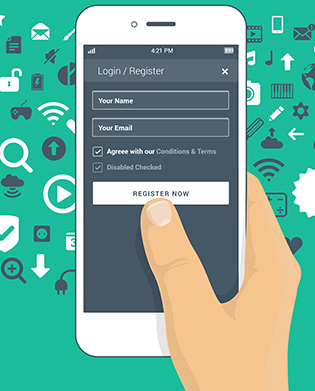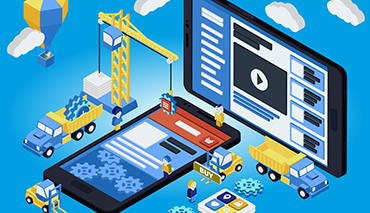A Step by Step Guide to Outsource App Development to India

India has become the most popular destination for offshore app development in the world, with a staggering 40% of all offshore app development projects now happening on that country’s soil.
With huge advantages for outsourcing such work, including low-cost labor and access to skilled resources, India is a natural choice for businesses looking to expand their business globally.
When it comes to developing apps, the main options are:
- in-house development by a dedicated team;
- contracting some work out to an agency or freelancers;
- or outsourcing altogether.
The last option is hands-down the most effective, but also comes with its own set of challenges.
In order to make outsourcing worthwhile, companies need a clear and structured plan that is well-managed from start to finish. They also need to understand exactly what they want from their mobile app development project. Apps can be developed for anything from your business’s internal processes to marketing and revenue generation.
Consider what your business wants to achieve from the app, in terms of function, platform support, costs and so on. If you don’t know whether or not an app is right for you, then it probably isn’t! Having a clear idea of what you want will ensure that the project is managed correctly from start to finish.

In-House Team or Offshore App Development Agency?
It is tempting to keep as much of your app development process in-house as possible, but that can be an expensive and time-consuming option.
What’s more, it doesn’t take into account the extra resources needed for maintenance and support once the project is complete.
Offshore companies are often very experienced at managing projects effectively, which means minimal disruption and an end product delivered on time.
There are dozens of offshore app developers in India, which means that you can choose one appropriate for the needs of your project – whether they focus on iOS or Android platforms (or both), have years of experience in a specific industry or even specialize in niche technologies.
Why Outsource Application Development?

By offloading the mobile app development process to experts, businesses benefit from both cost and time savings. Not only are you getting experienced developers for cheaper than you would pay in your own country, but when an agency is handling staffing and project management issues, they can help keep costs down.
If your business has a core team of resources that it can devote to your application development project, then in-house development might be a better option. However, if you have temporary or specialist skill sets that can be brought on board for shorter or longer periods of time (or both), offshore teams are well-suited to this kind of work.
If your business has a core team of resources that it can devote to your application development project, then in-house development might be a better option. However, if you have temporary or specialist skill sets that can be brought on board for shorter or longer periods of time (or both), offshore teams are well-suited to this kind of work.
By splitting the workload between in-house and external resources, your business can keep costs down while still getting everything done on time.
Offshore app development is also a great way to build up a valuable pool of developers who you can then tap into for future projects.
What Happens During App Development?

Most app development work will begin with an early-stage meeting between the client and agency in order to establish what they want from the final product. This initial meeting is a chance to find out exactly what it is that your business wants to achieve, as well as any objectives or specific requirements the project is going to need to meet.
An outline is then created for the app development phase, which includes a detailed description of what is required from both sides. This can (and should) be a very thorough document that covers everything from design issues and page templates to functionality and monetization options.
Developing a comprehensive document like this is a good idea for several reasons:
- it helps to ensure that the project runs smoothly;
- it makes it easier to manage multiple projects at once;
- and, if you ever need to hire another agency in the future, they will have your exact needs right there in front of them, saving time and money.
The rest of the project will depend on what you want to achieve, but it is likely that you will need to provide your developer with specifications and designs if you want to get your idea across effectively.
How to Outsource App Development to India: Step by Step
Once you have established how important mobile apps are for your business, it’s time to get down to the nitty-gritty of finding and working with an offshore app development agency in India.

Step 1: Choose Your Team
As we have already discussed, you can choose an agency that focuses on a specific industry or one that is able to undertake all kinds of mobile app projects. It might be easier to find the kind of agency you want if you’re working in a particular
niche field, but it’s not essential; just make sure that your needs are met.
Step 2: Get a Quote
You can find hundreds of agencies online, and it will likely take some time to work through all the options. It’s in your best interests to get a quote from at least 5 different outlets so you can compare their price ranges. Be sure to ask for an estimate for both complete app development and ongoing maintenance contracts; this way you can get a better idea of what your costs will look like.
You should also take the time to read some customer reviews online; this will help you understand how others think an agency performs and if they were happy with the results.
Step 3: Choose the Right Contract

Once you have quotes from at least 5 Indian IT offshoring agencies, it’s time to review the contracts on offer. This might seem like a daunting task, but it’s really just a case of reading through each one carefully; this is particularly important if you are an individual looking for freelance work rather than a business owner or manager.
Contracts usually include terms and conditions regarding ownership rights, minimum or guaranteed payment amounts and payment periods, and often include information about how to deal with disputes that may arise during the project.
If at any point you are not sure what something means or if you need more detail, contact your chosen agency for clarification. Remember that getting the wording right on this document could prevent serious conflicts in the future.

Step 4: Start the Project
Once you and your app development outsourcing company have signed a contract, they can start work on your mobile app development project. The length of time this takes will depend on the size of the project as well as how quickly
everyone involved is able to respond when new information arises.
Step 5: Complete the Project
You may be tempted to get involved in the project and help wherever you can. If you are doing this, make sure that all of your input is welcome; if it turns out that your ideas are not suitable, it’s best to let the agency take charge.
It’s a good idea for you to work together with the team during development so that you can remain in touch with how the project is doing. This will help you to spot errors and make any necessary updates as soon as possible, which should make it a smoother process overall.

Step 6: Market Your App
It’s very likely that you have created your app for a reason – whether that was simply for fun or to boost sales – so you will need to do some marketing work in order to ensure that it’s seen and used by enough people.
There are many different marketing options available, including building hype on social media, organizing a launch event and working with journalists, bloggers and reviewers. You should think about which of these appeals to you and your audience most so you can get the most from your marketing efforts.
Step 7: Monitor Your Business
Your app development agency will work with you to develop a maintenance plan that works for you; this can include things like making design updates or adding new features if necessary. It’s a good idea to monitor how your app performs in the market, and it’s usually best to hire someone else to do this for you.

As you have no doubt heard, having an app created can be a lucrative business because of the millions of people who use apps every day. However, it’s not uncommon for things like unexpected costs and design changes to turn what was supposed to be a simple process into something that could ruin your budget. If you take the steps listed above, you can avoid this and ensure that your app development project is as smooth as possible.

How Much Does Developing an App Cost?
As with everything in life, you get what you pay for. If you choose to outsource app development work to India, this does not mean that you will pay a fraction of the price compared to your local app developers.
The average cost of mobile app development in India is $7,000 to $35,000. This is a broad range as it depends on many factors, including the size of your app,
how soon you need it and which features are included.
Outsourcing app development to India also means that you can adjust your budget as per requirement. You can actually increase or decrease the number of features to add in order to meet your targeted audience and reach more customers.
Final Word
Outsourcing helps you save a lot of money and time. Outsourcing app development to India is quite popular these days because people are aware of the cost benefits. It doesn’t necessarily mean that you will compromise on quality in order to save costs.
If you still have your doubts about where to outsource your project, we would suggest that you get in touch with us at Digitechnique and our team will help you get started, answer any questions or concerns that you might have regarding the process or address any concerns you might have regarding outsourcing to India or about the project in general.
